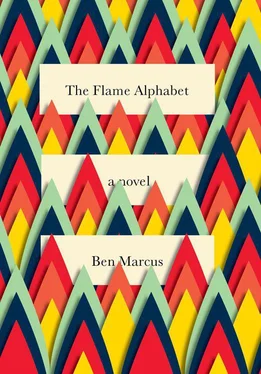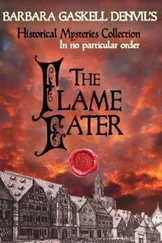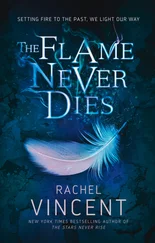I left a trail of Post-its that would lead Esther to the cake, which I’d positioned on a pedestal table within view of the peephole. We’d bored a hole into the crawl space door and now this was our little shelter beneath the staircase.
Next to the table I pulled up the children’s chair she used when she was younger. Surely she could still fit into it. And at this height she’d be right in our line of view, provided she didn’t move the chair and turn her back on us.
Inside our heads Claire and I could sing “Happy Birthday.” No one would have to hear. Esther wouldn’t even know we were there. She could enjoy her cake and it would be nice to be together again.
I pushed Claire into our cave beneath the stairway, tucked her all the way back, then crawled in myself. Claire did not rouse herself or show much interest. When the time came, when Esther returned, walked through the house, and then found the cake, I would wake Claire and help her see.
We settled onto our cushions, pulled shut the door, and waited. Claire leaned against me, seemed to whisper something, but I think she was speaking to herself.
From where I sat I could see perfectly through the peephole. That was a pretty cake on the pedestal, its little wax ball starting to sweat from the smoke. I was just fine to wait here.
It was dark and late when I woke beneath Claire’s damp body. Someone was in the house. I pressed my face to the peephole.
The footsteps shook the floor. Esther must have been wearing boots. She clomped through the house as if she were old and slow. I could hear every move as she walked near to us, then far. All I saw through the hole was the little silver cake on the table.
The steps drew closer, and then a voice called hello. A man’s voice.
Hello and hello and hello. He called out the name Steven ? Steven as a question. He asked if Steven was there. Walked through, opened and closed doors. Was Steven home? Anybody?
“Hello?”
It was Murphy.
I held my breath.
He was bundled for the cold. He stood huge in our little house. The room was doll-size with him in it.
He stopped next to the cake, let a finger drag through the frosting. He turned and looked at the door that sheltered Claire and me.
I stared at him through the peephole and did not move.
The wet rattle of Claire’s breath seemed suddenly loud. I could not shush her. Even placing my hand over her mouth would not work. The sound didn’t come from her mouth, but from her chest, her whole body. Our hiding place vibrated with Claire’s gasps.
Murphy walked off, resumed calling out hello , but in a lifeless, obligatory way, as if he couldn’t turn off his voice.
I waited for Murphy to leave, but he took his time. He went upstairs, came down, went back up. At one point it seemed that he pulled up a chair, sat for a while, before scooting out again.
In our bedroom Murphy seemed to move some furniture.
Finally the front door closed and his steps retreated.
I kept on waiting, pictured Murphy walking to his car, opening it, getting in, and driving away. Then I pictured the same routine again, over and over, until I could be sure that he was far away.
Except I could never be sure of that.
Claire’s weight was stifling, a wet pressure. I pushed her off me and climbed out of the crawl space to survey the damage.
All throughout the house everything seemed as it was, except upstairs I discovered that the hut repair box was missing from my drawer. The little tools meant to fix the listener at the Jewish hole, tools I’d never needed to use. This box was all that was missing. For all of Murphy’s raucous rummaging he hadn’t taken much.
But the cake had been disturbed. Not eaten, but violated, the ball of wax collapsed, smokeless. Something had been dropped on the cake, then removed. I made a fist, held it above the ruined cake. This was too large.
The size of the crater was just right for Esther’s hand, I reasoned. Balled up, punching down.
I couldn’t believe she would destroy her own cake. Certainly the cake had collapsed because I had baked it poorly, failed to follow a recipe. It was stupid to think I could go in the kitchen and improvise like that.
Perhaps Esther was not hungry. Perhaps she came in and saw the cake and decided she might have a slice later on. Only not now. After dinner, maybe.
I’d put it in the refrigerator, is what I would do. The cake would be there for her when she was hungry. Perhaps when I was feeling better I would have a piece, too. Maybe Esther and I could sit quietly together over a piece of cake. I’d skin back my frosting for her, because she liked extra. There’d be no reason to speak. We could enjoy each other’s company in silence, in the kitchen, on her birthday. If I could find a candle, an old-fashioned one, we’d light it up. It’d be nice to sit together, listening to our forks click on the plates. We’d be sure to save a piece for her mother.
LeBov died that week. A feature ran on the news, a final piece of television. He was sixty-two. Or he was sixty-eight. An assistant found him at home, where he lived alone. Two of his many children apparently lived nearby. I missed the picture they flashed of him, but then a photo of one of LeBov’s sons, cast up on the screen, showed a suntanned, elderly fellow with a white ponytail. LeBov’s son . There was no mention of a wife. LeBov had been taken to a private facility in Denver where he later expired. This was the language used by the newscaster. Expired .
There would be no funeral.
According to the news, LeBov was perhaps the first researcher, certainly the most outspoken, to identify the threat of language.
All the good it’s done , I sat there thinking.
The editorial assessment of the news program was that LeBov’s death was particularly distressing at this time, given our current situation.
A toxicologist by training, they called LeBov. He had lived mostly in Canada, spent the early years of his career developing his theory of a primary allergen, allergy zero.
Later in his career LeBov focused on the toxic properties of language. Most recently, until his passing , he had been the director of a private research lab in Rochester called Forsythe. He was working closely with health officials on the problem of the viral child.
“Claire!” I called out into the cold house.
LeBov was known for disseminating his views in underground publications. Designed, some said, deliberately to mislead. Filled with false information and historical inaccuracies invented to bolster his theories.
A montage spun together clips of other scientists appraising LeBov’s contributions. He merited scorn, derision, from a pedigreed cohort, doctors, scientists, linguists. But these were old clips, exhumed from an archive somewhere, stitched together to form a portrait. All the footage was from well before his death, before his recent lunge into credibility. These men and women, pronouncing on the now dead LeBov, projected a vital cheer quite terrible in hindsight—sitting in offices or newsrooms while off-loading their expensive opinions about someone they could safely dislike in public.
These scientists had yet to live in these times. Today, yesterday, the past few months. Their short-term futures were going to hurt, and they had no idea. Where were these fine people now? I wondered. Were they hiding yet?
Have you found shelter? Is it finally quiet and safe where you are? I wanted to ask them.
Not a person alive could be made to talk like that now, look so healthy, using language as if it did not break something in us.
Even the newscaster, broadcasting live, wore a bloodless mask, staring, one supposed, at the words on the teleprompter. Eating the vile material for his very employment, each word producing the crushing. You could tell. He seemed to weaken by the second. They’d done him up in television paint. One could see that this man did not have long. For some reason I recall his name. Jim Adelle.
Читать дальше











